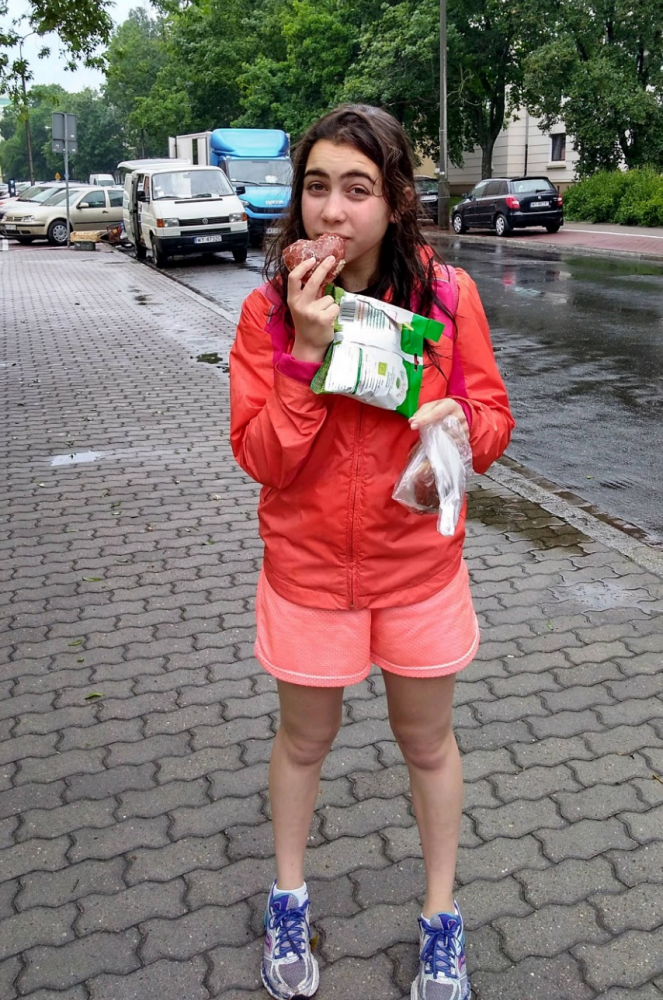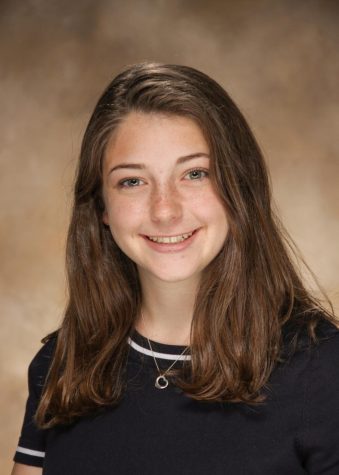From Poland with Poems
photo courtesy of Selah Bickel
Junior Selah Bickel takes a bite out of the only kosher “paczki,” Polish jelly doughnut, that she could find in Poland. She also holds her favorite apple chips.
September 20, 2017
When junior Selah Bickel lived in Poland for six months last year, she lost the comfort of a familiar language, but found creative inspiration for her poetry, especially on the public bus of Warsaw.
“It’s really, really crowded and you’re like stuffed, and you have no room to breathe, and then people were speaking Polish, and you’re like, ‘Oh my God, I don’t understand a word of this!’” Bickel said.
Bickel spent the second half of her sophomore year living in Poland before starting at CESJDS in August.
JDS was the fourth school she attended, but it was a particularly new adventure for her. Bickel was born in Boston, then moved to Maryland and enrolled in the Berman Hebrew Academy. After sixth grade, she switched to the Siena School in Silver Spring.
In the fall of 2016, her mother, a professor of Jewish History at Pennsylvania State University, decided to pursue a research project in Poland about the history of Jews living under Communist rule.
“Hey Selah, want to come to Poland with me?” Bickel recalled her mother, Eliyana Adler asking in the car on her way to school. Bickel said yes. But when she told her classmates, “They were like, ‘What the heck? Where the heck is Poland?’”
Bickel knew the move would be a challenge, but she was excited. Her parents enrolled her in the American School of Warsaw. While there was a Jewish school in Poland, it only went through middle school and was taught in Polish.
“[The American School of Warsaw] was just a tremendous opportunity for Selah to meet people from all over the world and find out the ways that they are the same and the ways that they are different,” Adler said.
On weekends, Bickel and Adler traveled to small, desolate towns, exploring what used to be Jewish communities. They learned the fate of the old synagogues, Jewish community centers and mikvahs, Jewish ritual baths.
While on one of their outings, Bickel met a 19-year-old Polish girl who had found out she was Jewish only two years earlier. The girl was brimming with enthusiasm about her newfound identity.
“It was so cute because, for me, it’s never been like ‘oh my God, it’s so cool [to be Jewish],’” Bickel said.
Even after Bickel left Poland, she has made a point to stay in touch with her new friend. The connection with a local Jew was a rare occurrence, though. In fact, the lack of diversity in Poland surprised Bickel. With her curly brown hair and dark eyes, she felt out of place in Warsaw.
“There is a certain ‘Polish look,’ and I did not have it,” Bickel said.
Poles would ask Bickel where she was from, and Bickel would respond, “America.” The Poles seemed confused because Bickel did not look like their idea of an American girl. They told her that stereotypical girls in American movies looked “snobby,” and like “mean girls.”
When Bickel added that she was Jewish, the conversation would take a turn.
“Oh, you look Jewish,” Bickel recalled was the standard response. Bickel remembered feeling her cheeks burn red with shame.
“Looking Jewish isn’t really thought of as a good thing [in Poland],” she said.
Bickel returned to the United States with the perspective of an outsider, noticing the quirks and differences in American society that never really stood out before. According to Bickel, Americans smiled more and were less cold. More than ever, she noticed the diversity of America and the way it embraces so many different cultures and religions.
“I have [a] greater appreciation of the world, now,” Bickel said. “I lived there and understand the everyday problems.”
Adler was pleased with Bickel’s growth. She had hoped her daughter would travel more and become “more adventurous.”
At the end of their journey, Adler was grateful to find a school that was so “attractive” in Maryland. Bickel decided to attend JDS because her older sister Rana Bickel had graduated from JDS in 2016. Adler was impressed with the academic rigor of the school and the emphasis on college preparation.
When she started school at JDS, Bickel was excited to join the cross country team. She has been running since fifth grade. In a race on September 11, Bickel placed first for the varsity girls team, clocking in at 25 minutes and 4 seconds in the 5-kilometer race.
“She has proven to be a standout on the team,” varsity cross country coach Kelly Grosskurth said. “She brings a lot of character and spunk.”
Grosskurth hopes that Bickel’s speed will motivate other female runners to work harder and run faster. In addition to cross country, Bickel is considering joining the model UN, debate and mock trial teams.
After JDS, Bickel dreams of becoming a political activist and poet.
“I want to make a difference in the world, and write great poetry,” Bickel said.









